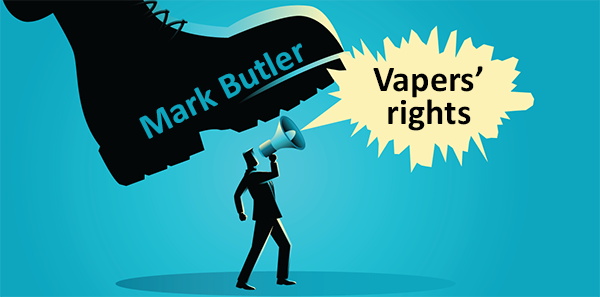
Mark Butler is coming for Aussie vapers
Posted on November 28, 2023 By Colin
THE HEALTH MINISTER has announced today the timeline for his long-awaited crackdown on vaping. The importation of disposable single-use vapes will be banned from 1 January 2024 and the personal importation of any vapes or e-liquids (including all refillable devices and nicotine-free e-liquids) from overseas will be banned from 1 March 2024.
Other changes include [media release here]
- All doctors and nurse practitioners will be eligible to prescribe nicotine for vaping (1 Jan 2024)
- New product standards for vapes to be introduced restricting flavours (likely to tobacco and mint), reduce nicotine concentrations (probably to 20mg/mL) and making pharmaceutical packaging mandatory (1 March 2024)
- Pre-market approval. New products to confirm compliance before importation (1 March 2024)
- Legislation to prevent domestic manufacture, advertisement, supply and commercial possession of non-therapeutic and disposable single-use vapes (Therapeutic Goods Act, autumn 2024 legislation)
- Vape importers will need a licence and permit from the Office of Drug Control
- An additional $25m to the Australian Border Force and $56.9m to the Therapeutic Goods Administration over two years for enforcement.
A Bill will be presented to the federal parliament in February 2024 to approve those changes which require legislation. The Bill requires approval of both houses of parliament and may not be passed. The Liberals and federal Greens have yet to declare their position.
Will this plan work?
There are many weak links in Butler’s plan.
Firstly, the support of health professionals in writing nicotine prescriptions. Most remain skeptical and poorly informed about vaping and most are not willing to be involved. Vapers struggle to find a supportive doctor, and this is unlikely to change. Pharmacists also have not been engaged with vaping and few hold stock, especially as the demand has been low for legal prescribed products.
In any case, vapers have rejected the prescription model. Only 8% of vapers had a prescription in March 2023 and this and this seems unlikely to change significantly.
Vapers are concerned about the very restricted range of products likely to be available from pharmacies. The narrow choice of flavours (tobacco and mint), device types and a low nicotine limit will make pharmacy products less appealing. Cost and pharmacy markup is another major barrier for many low-income vapers.
However, the plan will finally destroy the legitimate vaping industry in Australia, resulting in loss of employment and government revenue.
The black market
But the elephant in the room remains the black market which was created by the prescription model in the first place. It is highly profitable, well established and resilient and controlled by organised crime networks.
The black market will go underground and continue to prosper. Illicit products will continue to flow across the border. In spite of its best efforts, the Border Force has had little impact on illegal vape imports to date and the $25 million allocated for the next 2 years will make little difference in screening the 8 million shipping containers imported annually. State Health Departments have failed repeatedly to police and enforce retail sale laws with any success.
As further products are banned, the black market will step up and supply what people want, including a wider range of products and flavours. These products are not regulated and put consumers at greater risk. Remember the EVALI outbreak Mark Butler?
Mr Butler’s main concern is youth vaping, but is a further ban the solution? Past experience shows that bans are not effective. Young people find a way to access forbidden products. For those that don't, there are always cigarettes! Bans on youth access lead to greater smoking and more harm to public health overall.
In any case, Mark Butler's concerns about youth vaping are not based on solid evidence. There is no evidence that vaping is addicting a new generation. The is no good evidence that vaping is a gateway to smoking. In fact, it is diverting more young people away from smoking overall. Regular vaping by non-smoking youth in Australia is rare. Many of his other claims about vaping are revealed as porkies on closer examination.
Conclusion
This attempt to resuscitate the flawed prescription model is doomed to fail. Bans don't cause an unwanted product to disappear. They just hand the market to criminal suppliers.
Criminals will continue to provide unregulated products freely to children, and adult smokers will have restricted access to effective, appealing and affordable regulated vapes. And of course deadly cigarettes will remain freely available!
The big winners will be organised crime and Big Tobacco. The losers are public health, human rights and the economy.
Media release
Media release. Mark Butler. Next steps in vaping reforms 28 November 2023
My media release 28 November 2023
- dddf
- 2334
- dddff